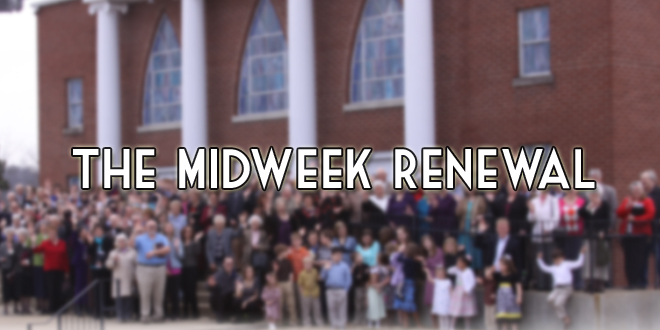I’m going to make a statement and I want you to know that I mean no disrespect to anyone. In fact, I love everyone. My job is very much a “people job,” and I love every opportunity I have to point people to the Scriptures and to have people help me in my spiritual journey to heaven. Here’s the statement: I’m not interested in any religious system that has its roots in men. While it may be sincere, culturally accepted, or even traditionally significant to my family or close friends, if you can’t find the religious system of which you’re a part in the Bible, then I just don’t feel comfortable trusting it for my salvation (cf. Mat. 7:21-23).
If you’re really looking for it, you won’t miss the Lord’s church. It is described – in detail – in the Bible; in both the Old and the New Testament. The following Scripture chain takes you from the prophecies to the New Testament church’s establishment. That’s the church that I want to be a part of. That’s the one for which Christ died (Acts 20:28). That’s the one in which salvation is found (Acts 2:47).
See what you think about the chain of Scriptures. I know there are many others that could be mentioned, but these give us a complete picture and provide us with the basic framework upon which the church was promised, preached, purchased, and propagated.
Isaiah 2:2-3
- When would these things come to pass? The last days (see Hebrews 1:1-2).
- Where would these things come to pass? Jerusalem
- What would happen? The Lord’s house would be established (see 1 Timothy 3:15)
- Who would be welcomed into the Lord’s house? All nations
Daniel 2:44
- What was going to happen? The God of heaven would set up a kingdom.
- How long would the kingdom last? It would never be destroyed.
- What would it do to other kingdoms? It would outlast them all. It would break them into pieces.
- When would this take place? In the days of these kings. Secular history tell us this would be the time of the Roman empire (see Daniel 2:24-45).
Joel 2:28-32
- What would happen? The Spirit of God would be poured out upon all flesh.
- When? After many signs.
- What will be the result? Whoever calls on the name of the LORD shall be saved.
- Where will this take place? In Jerusalem.
Zechariah 1:16
- What would be built? The Lord’s house (see Isaiah 2:2-3; 1 Timothy 3:15).
- Where would it be built? In Jerusalem (see Isaiah 2:2-3; Joel 2:28-32).
Matthew 2:19-3:2
- NOTE: Chronologically speaking, there is a 20-25 year gap between Matthew 2:23 and Matthew 3:1 (this is evident because, in chapter 2, Jesus was a toddler, while, in chapter 3, John the Baptizer was preaching in the wilderness of Judea. John was only six months older than Jesus).
- The 20-25 years is significant because, during that time, the Roman Empire came into power in that area. The time was right for the church to be preached (see Daniel 2:44, “in the days of these kings”).
- What was at hand? The kingdom of heaven (3:2).
- Had it arrived yet? No, it was “at hand.”
- Who spoke these words? John, the Baptizer.
Matthew 16:13-19
- What did Jesus promise to build? His church (Matthew 16:18).
- Did He build it right then and there? No, He promised to build it (“I will build my church”).
- Upon what did Jesus promise to build His church? Upon Peter’s confession that He is the Son of God.
- To whom did Jesus give the “keys to the kingdom?” Peter.
- NOTE: Jesus here uses the terms “church” and “kingdom” interchangeably. Therefore, the church and the kingdom are one and the same (also see Colossians 1:13-14, 18).
Mark 9:1
- Jesus said that some who were standing there with Him would not die until what happened? Until the kingdom came.
- How would the kingdom come? With power.
Luke 24:46-49
- Was the death, burial, and resurrection of Christ necessary for the gospel to be preached? Yes. Jesus said it was the only way (see also John 14:6).
- To where did Jesus send the apostles after He told them these things? Jerusalem (see Isaiah 2:2-3; Joel 2:28-32; Zechariah 1:16).
John 18:36
- Since the kingdom is the Lord’s church, does the Lord’s church have an earthly headquarters? No. Jesus said His kingdom is not of this world.
Acts 2
- Where did the events in Acts 2 take place? In Jerusalem for the Jewish Pentecost celebration (Acts 2:1, 5; see Isaiah 2:2-3; Joel 2:28-32; Zechariah 1:16; Luke 24:46-49).
- What miraculous thing happened that day? There was a sound from heaven like a rushing, mighty wind and divided tongues, as of fire, sat upon each of the apostles. The apostles were able to speak and to be understood in the native tongue of all of those who were present that day. These were languages that the apostles had never studied (see Acts 2:5-12). This was the Holy Spirit (Acts 2:4; see Mark 9:1; Luke 24:46-49).
- When the Jews inquired about these events, to what did Peter attribute them? He said, “this is what was spoken by the prophet Joel…” (Acts 2:16-21; see Joel 2:28-32).
- Of what were the Jews guilty? They had crucified Jesus (Acts 2:36).
- What was their reaction? They were pricked in their hearts and desperately cried to the apostles, “Men and brethren, what shall we do?” (Acts 2:37).
- What were they told to do? To repent and to be baptized, every one, in the name of Jesus Christ, for the remission of sins (Acts 2:38; see Joel 2:28-32).
- How many were baptized that day? About 3,000 souls (Acts 2:41).
- When they were baptized, to what were the obedient believers added? The church (Acts 2:47).
- Who added them to the church? The Lord did (Acts 2:47).
- How does the Bible describe those who were added to the church? As “those who were being saved” (Acts 2:47).


